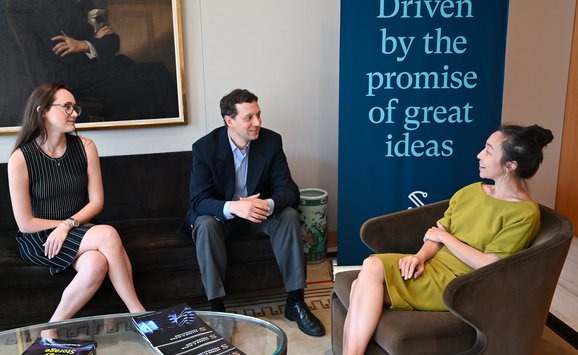In our Supporter Spotlight magazine feature, we hear directly from donors about their commitment to issues in climate, energy, and the environment; how they make a difference; and why they support Resources for the Future—all in their own words.
Resources recently spoke with Jan Mazurek, a senior director at ClimateWorks Foundation, and previously an advisor at the California Air Resources Board and US Environmental Protection Agency. Below are excerpts from the conversation, which touched on the role of philanthropy in catalyzing climate action, the importance of durable climate solutions, the magic of Resources for the Future, and more.
Resources magazine: Can you tell us about your priorities for carbon removal and aviation at ClimateWorks? What excites you about the related work that you help support at Resources for the Future (RFF)?
Jan Mazurek: Our mission is to help catalyze philanthropic ambition to, firstly, take emissions to zero. We now find ourselves in the situation of having to obtain negative emissions by midcentury in the amount of 10 gigatons per year. It’s an enormous task, and philanthropy is probably one of the best actors to take it on.
I’m interested in questions about durable compliance. Although legislation has led to direct air capture hubs and expanded the 45Q tax credit to bring down costs of carbon dioxide–removal technology, will these approaches be sufficient to incentivize an activity that is a public good? Sure, I’m going to save on my electricity bill if I install a solar roof, or save on gas if I drive an electric vehicle—but no similar private benefits are associated with carbon removal.
What excites me about the carbon-removal work at RFF is that it provides the ability to interact with colleagues who are experts in economic and policy frameworks. A conversation I had earlier this week with the RFF team was one of the most exciting interactions that I’ve had since standing up this fund in 2015. Everyone is bringing their passions and sharp insights about policy feasibility to bear on these questions.
Your early career included time at RFF as a research associate in the 1990s. How did your work at RFF shape your career? How have you seen the organization evolve over the years?
I can track the arc of my career to RFF, starting with risk assessment and toxins. At RFF, I had the opportunity to work on topics that were of vital interest to the Clinton administration around the use of risk assessment to deploy scarce resource dollars. Twenty years later, I was called upon to deploy those skills to advise then-Administrator-Designate of the US Environmental Protection Agency Lisa Jackson on working with Congress to reauthorize the Toxic Substances Control Act of 1976. That was a major achievement—and a benchmark achievement for me, as well.
I have carried those lessons through the years, even though I, like RFF, have transitioned from a focus on conventional pollutants to the most urgent issue of the day, which is climate change.

You’ve worked on environmental and energy issues in government, as well as in philanthropy. How would you describe the role of RFF, and organizations like it, in supporting decisionmakers?
Harkening back to the period when we were thinking about carbon-trading systems and carbon taxes, and more recently the great work with implementing green hydrogen hubs—this continues to underscore the effectiveness of RFF, not only in the climate space, but also in the clean energy transition space and so many other areas leading up to where RFF is today. RFF still is uniquely positioned to provide impartial, unbiased, cutting-edge research that informs decisionmakers.
What do you think sets RFF apart from other organizations?
I don’t think that there is a brighter assemblage of smart, compassionate, and completely curious environmental and energy thinkers anywhere else in the world. The insights and positive externalities from interactions among the expert staff are unique, owing to this body of learning and adherence to rigor. RFF is still, thankfully, the magical, wonderful place that it’s always been and is doing great things for people and the planet.

Four Ways You Can Support RFF
- Give on our website: Visit www.rff.org/donate to make a one-time donation with your credit card, or to set up a monthly recurring donation.
- Give by mail: Send your check to Resources for the Future | 1616 P Street NW, Suite 600 | Washington, DC 20036
- Give through a donor-advised fund: Donate through a DAF account at a community foundation or financial institution to support RFF while receiving favorable tax benefits.
- Give through a will, trust, or gift plan: Include RFF in your estate plans to provide meaningful, long-lasting support.
Discover other ways of giving or contact Ryan Sabot for more information.






